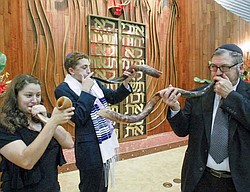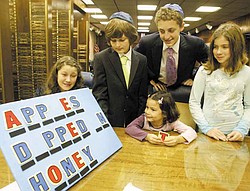Youths will gather for Rosh Hashana services Thursday and Friday
Rabbi Joseph Schonberger of Temple El Emeth in Liberty leads the sounding of the shofar (ram’s horn) during a practice session with Meryl Schor, 14, left, and Korey Burdman, 15. The traditional sounding of the ram’s horn will be part of High Holiday services. Rosh Hashanah begins at sundown tonight.
Elyse Silverman devised a “Wheel of Fortune”-style game for youth at Temple El Emeth. “Apples dipped in honey” relates to the traditional foods eaten at Rosh Hashanah to ensure a “sweet” new year. Guessing the phrase are, from left, Meryl Schor, Taylor Burdman, Korey Burdman, Ariella Westreich and Sophie Alpert.
By LINDA M. LINONIS
Liberty
The Rosh Hashana service for the junior congregation in the chapel at Temple El Emeth will mirror the reflective and repentive essence of the service for adults in the main sanctuary.
The youths, kindergartners through sixth-graders, will gather for services Thursday and Friday focusing on the essence of the High Holidays, which begin at sundown tonight. That is, looking ahead to the new year of 5772, reflecting on the year past, repenting for transgressions and promising to do better.
For the children, there will be crafts, games and refreshments after the services. On Yom Kippur, Oct. 8, there will be a children’s service in the morning and a blessing of the children that night.
“We have prayers specific for children,” said Elyse Silverman, program and education director at the synagogue. “We talk about their behavior and what they did over the year.”
Silverman said the service is meant to “have them think about what they’ve done and do better.” The theme revolves around the idea to “improve your actions,” she said.
The children’s service is mostly Hebrew, she said. The majority of the children attend Akiva Academy or Hebrew School, which is called Maimonides School of Jewish Education.
“Most of them are getting pretty fluent in the Hebrew prayers and the children’s service certainly helps them with sharpening those skills,” she said. English translations supplement the Hebrew prayers.
A popular book, “The Hardest Word” by Jacqueline Jules, is usually read. Silverman said even older children appreciate what she described as “the whimsical tale of a klutzy and funny-looking bird called a ‘Ziz,’ who makes a mistake.” Silverman said the gist of the book is how God sends the Ziz to search the world for the hardest word, which turns out to be “sorry.”
“It teaches the lessons of atonement and forgiveness in a humorous way that children can understand,” she noted.
Teaching moments are woven throughout the children’s services and activities. Silverman fashioned a “Wheel of Fortune”-style game for children to have fun with while learning ideas pertinent to the High Holidays. “Apples dipped in honey” is one such phrase that relates to the custom of eating the fruit with honey to ensure a sweet new year.
Silverman also has a shimmering length of paper that represents a stream of water into which children toss pieces of foam, representing bread. This Tashlich service is held the afternoon the first full day of Rosh Hashana and symbolizes throwing away sins. “We also talk about how they’ve behaved during the last year and how they can improve,” she said.
Silverman said one of the most moving services is the blessing of children on Yom Kippur. The children stand under a canopy held up by adults and are blessed by Rabbi Joseph Schonberger.
Rabbi Schonberger explained Rosh Hashana is the start of the new calendar in Judaism. “It is the anniversary of the creation of humanity,” he said. He added that the new year provides the time to reflect on one’s life in the year past and renew faith. “It is introspective,” he said of the penitential period.
Yom Kippur, the Day of Atonement, is the culmination of the 10-day period and is the most sacred day. It also recalls when Moses came down from Mount Sinai with revelations that form the basis of Jewish traditions.
After the solemnity of the High Holidays, the rabbi said, there is Sukkot, the harvest festival.
 43
43


